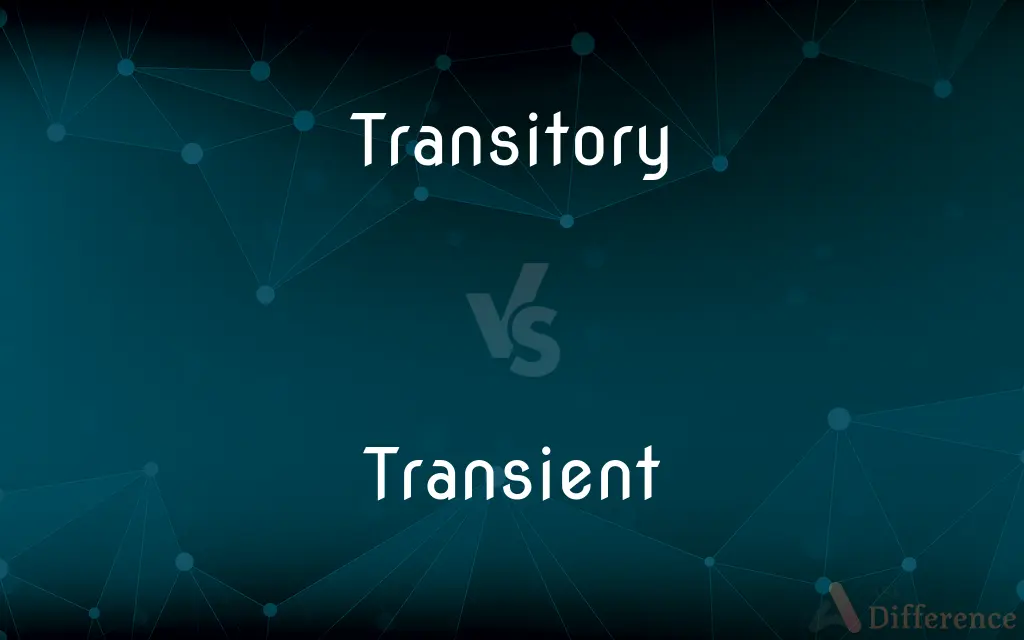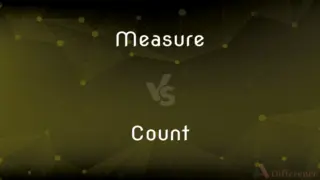Transitory vs. Transient — What's the Difference?
Edited by Tayyaba Rehman — By Urooj Arif — Updated on April 6, 2024
Transitory phenomena last for a short time, implying a gradual change or passing phase, while transient events are temporarily brief, often unexpectedly fleeting.

Difference Between Transitory and Transient
Table of Contents
ADVERTISEMENT
Key Differences
Transitory experiences have a nature of temporary existence but often suggest a process of change or transition over a period. For instance, adolescence is considered a transitory phase of human development. On the other hand, transient phenomena occur briefly and with a sudden or unpredictable nature, such as a transient shower of rain that starts and ends quickly.
The term transitory is frequently used in contexts that imply gradual or inevitable change, emphasizing the process rather than the brevity. Transitory economic conditions, for example, suggest fluctuations that are expected to stabilize over time. Whereas transient is more commonly associated with situations or events that appear and disappear swiftly, without a hint of permanence, like transient visitors to a city.
In literature, transitory themes may explore the fleeting nature of life and the inevitability of change, suggesting a reflective or philosophical tone. Transient themes, however, might focus on the abruptness of moments and the impact of fleeting experiences, often evoking a sense of surprise or immediacy.
Environmental scientists might describe climate patterns as transitory if they show temporary shifts before returning to a baseline or moving towards a new normal. In contrast, transient weather events are those that occur suddenly and last for a short duration, such as flash floods.
In technology, transitory errors in software are those that occur due to temporary conditions and are expected to resolve as conditions change, like a network congestion issue. Transient errors, however, are brief and abrupt, often requiring immediate but temporary fixes, such as rebooting a device to resolve a sudden crash.
ADVERTISEMENT
Comparison Chart
Duration
Short-term but implies a process
Brief, often sudden
Usage Context
Processes, phases, conditions
Events, visits, errors
Implication
Gradual change, passage
Suddenness, unexpectedness
Examples
Adolescence, economic conditions
Showers, visitors, software errors
Nature
Reflective of inevitable change
Emphasizes abruptness and surprise
Compare with Definitions
Transitory
Not lasting, enduring, or permanent.
The artwork captured the transitory nature of human existence.
Transient
Not permanent; passing with time.
His feelings of regret were transient, disappearing as soon as he distracted himself.
Transitory
Pertaining to a phase or period that precedes a more permanent state.
His position as an intern was seen as a transitory step towards full-time employment.
Transient
Pertaining to something that is brief and does not last long.
They lived a transient lifestyle, moving from place to place.
Transitory
Characterized by changeability and temporary nature.
Teenage rebelliousness is often a transitory phase.
Transient
Existing briefly and likely to change or end suddenly.
The city's population swells with transient workers each summer.
Transitory
Lasting for a short time but implies a gradual passing or change.
The transitory beauty of autumn leaves reminds us of the constant change in nature.
Transient
Lasting only for a short time; temporary.
The transient storm left the skies clear and blue by afternoon.
Transitory
Reflecting a temporary state in a process of transition.
The fluctuations in the stock market were considered transitory by the economists.
Transient
Quickly disappearing; fleeting.
The transient beauty of a shooting star is mesmerizing.
Transitory
Not permanent
Transitory periods of medieval greatness
Transient
Lasting only for a short time; impermanent
A transient cold spell
Transitory
Existing or lasting only a short time; short-lived or temporary
"the disorder of his life.
Transient
A person who is staying or working in a place for a short time only.
Transitory
Lasting only a short time; temporary.
Transient
A momentary variation in current, voltage, or frequency.
Transitory
(law) Of an action: that may be brought in any county
Transient
Passing with time; transitory
"the transient beauty of youth" (Lydia M. Child).
Transitory
Continuing only for a short time; not enduring; fleeting; evanescent.
Comfort and succor all those who, in this transitory life, are in trouble.
It was not the transitory light of a comet, which shines and glows for a wile, and then . . . vanishes into nothing.
Transient
Remaining in a place only a brief time
Transient laborers.
Transitory
Enduring a very short time;
The ephemeral joys of childhood
A passing fancy
Youth's transient beauty
Love is transitory but at is eternal
Fugacious blossoms
Transient
(Physics) Decaying with time, especially as a simple exponential function of time.
Transient
One that is transient, especially a hotel guest or boarder who stays for only a brief time.
Transient
(Physics) A transient phenomenon or property, especially a transient electric current.
Transient
Passing or disappearing with time; transitory.
A transient pleasure
Transient
Remaining for only a brief time.
A transient view of a landscape
A transient disease
Transient
(physics) Decaying with time, especially exponentially.
Transient
Having a positive probability of being left and never being visited again.
Transient
Occasional; isolated; one-off
Transient
Passing through; passing from one person to another.
Transient
(music) Intermediate.
Transient
(philosophy) Operating beyond itself; having an external effect.
Transient
Something that is transient.
Transient
(physics) A transient phenomenon, especially an electric current; a very brief surge.
Transient
(acoustics) A relatively loud, non-repeating signal in an audio waveform that occurs very quickly, such as the attack of a snare drum.
Transient
A person who passes through a place for a short time; a traveller; a migrant worker.
Transient
A homeless person.
Transient
A module that generally remains in memory only for a short time.
Transient
(Philippines) homestay
Transient
Passing before the sight or perception, or, as it were, moving over or across a space or scene viewed, and then disappearing; hence, of short duration; not permanent; not lasting or durable; not stationary; passing; fleeting; brief; transitory; as, transient pleasure.
Transient
Hasty; momentary; imperfect; brief; as, a transient view of a landscape.
Transient
Staying for a short time; not regular or permanent; as, a transient guest; transient boarders.
What is loose love? A transient gust.
If [we love] transitory things, which soon decay,Age must be loveliest at the latest day.
O fleeting joysOf Paradise, dear bought with lasting woes.
Transient
That which remains but for a brief time.
Transient
One who stays for only a short time;
Transient laborers
Transient
(physics) a short-lived oscillation in a system caused by a sudden change of voltage or current or load
Transient
Of a mental act; causing effects outside the mind
Transient
Enduring a very short time;
The ephemeral joys of childhood
A passing fancy
Youth's transient beauty
Love is transitory but at is eternal
Fugacious blossoms
Common Curiosities
What defines a transitory period?
A transitory period is characterized by temporary conditions that signify change or transition towards a more stable or permanent state.
What makes a weather event transient?
A weather event is transient if it occurs suddenly and lasts for a short duration, like a flash flood.
How do transient events differ from transitory ones?
Transient events are brief and often unexpected, while transitory ones last for a short time but imply a gradual process of change.
What is a transient population?
A transient population is one that does not stay in one place for long, often moving due to seasonal work or other factors.
How do transitory and transient perspectives affect planning?
Planning with a transitory perspective accounts for expected changes over time, whereas planning for transient conditions prepares for sudden and brief changes.
Is adolescence transitory or transient?
Adolescence is considered transitory because it is a phase of development leading to adulthood, marked by gradual changes.
Can economic conditions be transient?
Yes, economic conditions can be transient if they represent brief, sudden changes rather than part of a gradual process.
Are all errors in technology transient?
Not all technology errors are transient; some are transitory, indicating temporary conditions that will change, while transient errors are brief and abrupt.
Can a lifestyle be transitory?
A lifestyle can be considered transitory if it reflects a phase towards a more permanent or stable way of living, indicating gradual change.
Is transitory always related to time?
Yes, transitory always involves a temporary state or phase, though it emphasizes the process of change over time.
What is the significance of transitory art?
Transitory art explores themes of change, impermanence, and the passage of time, often evoking reflection on life's fleeting nature.
Why might someone prefer a transient lifestyle?
Some may prefer a transient lifestyle for the freedom, diversity of experiences, and flexibility it offers, despite its brief and changing nature.
Can feelings be transitory?
Feelings can be transitory if they represent a temporary state in a process of emotional change or development.
Can a job be considered transient?
A job can be considered transient if it is expected to last only for a short period and does not offer long-term engagement.
Are transient phenomena always unexpected?
While not always, transient phenomena often carry an element of suddenness or unpredictability.
Share Your Discovery

Previous Comparison
Calcite vs. Gypsum
Next Comparison
Measure vs. CountAuthor Spotlight
Written by
Urooj ArifUrooj is a skilled content writer at Ask Difference, known for her exceptional ability to simplify complex topics into engaging and informative content. With a passion for research and a flair for clear, concise writing, she consistently delivers articles that resonate with our diverse audience.
Edited by
Tayyaba RehmanTayyaba Rehman is a distinguished writer, currently serving as a primary contributor to askdifference.com. As a researcher in semantics and etymology, Tayyaba's passion for the complexity of languages and their distinctions has found a perfect home on the platform. Tayyaba delves into the intricacies of language, distinguishing between commonly confused words and phrases, thereby providing clarity for readers worldwide.














































